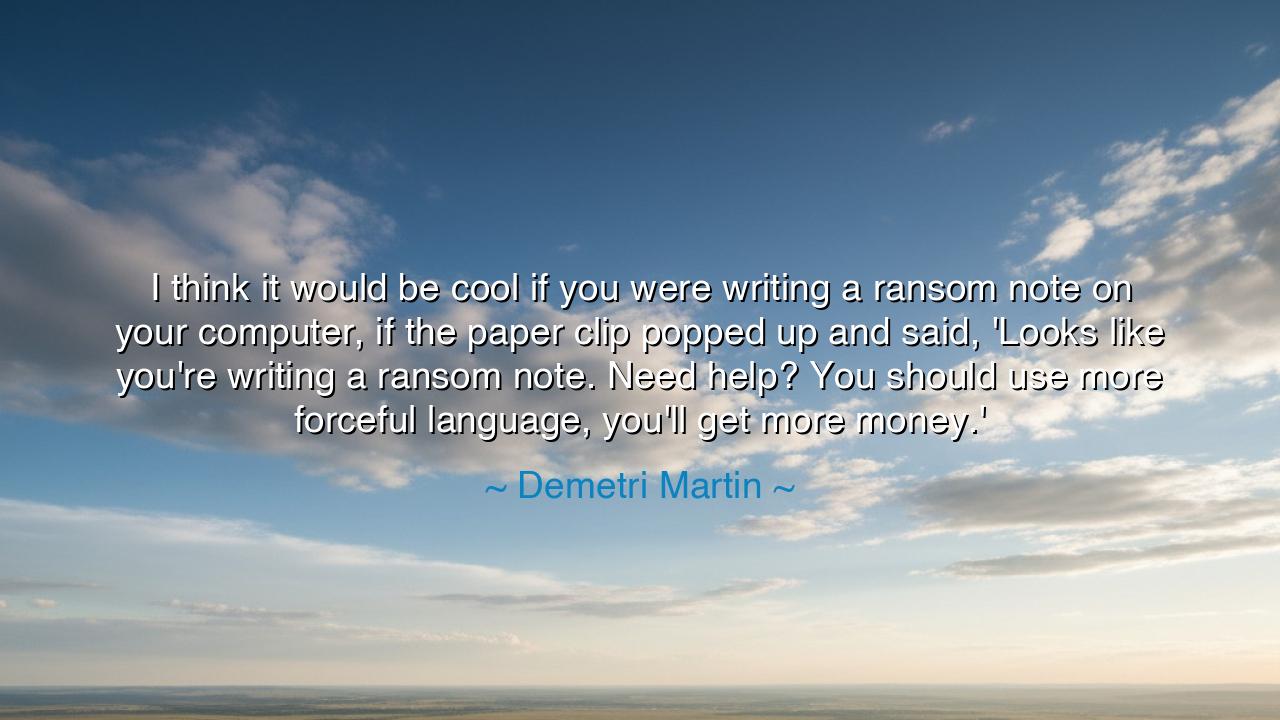
I think it would be cool if you were writing a ransom note on
I think it would be cool if you were writing a ransom note on your computer, if the paper clip popped up and said, 'Looks like you're writing a ransom note. Need help? You should use more forceful language, you'll get more money.'






"I think it would be cool if you were writing a ransom note on your computer, if the paper clip popped up and said, 'Looks like you're writing a ransom note. Need help? You should use more forceful language, you'll get more money.'" These humorous words from Demetri Martin may seem like a lighthearted joke about technology and its sometimes absurd interventions, but within them lies a deeper commentary on the nature of automation, humanity, and the ever-increasing presence of technology in our lives. The image of a virtual assistant, like the notorious Clippy from Microsoft, offering advice on writing a ransom note, serves as a satirical reminder of how technology often lacks nuance and understanding, distorting the very human experiences it is meant to assist.
In the ancient world, the written word was seen as sacred, an expression of the deepest thoughts and intentions of the human soul. The Greeks, particularly Homer, understood that the act of writing was not simply the physical act of forming letters, but a sacred communication, bridging the thoughts of one person to the minds of many. And yet, the irony in Martin’s quote—the thought of a robotic assistant advising on criminality—highlights how we, in our modern age, have come to reduce the profound act of human expression to something mechanical, devoid of emotion and meaning. Technology, rather than elevating us, at times seems to strip away the depth of our humanity.
Think, too, of the great philosophers who wrote with intent and purpose—Plato, who sought the wisdom of the universe, and Aristotle, whose ethics were a pursuit of the highest virtues. Their writings were not just tools of communication but manifestations of thought, the fruit of deep contemplation. In stark contrast, Martin's quote envisions a world where something as serious as a ransom note, a document of threat and desperation, is reduced to a matter of "better language"—a callous manipulation of words to achieve an end. In such a world, it is technology that guides human decisions, rather than the moral compass of the individual.
Yet, in a more modern sense, this quote reveals the irony of our dependence on technology, how it often substitutes human judgment for cold, automated logic. In the ancient world, wisdom came from reflection, experience, and dialogue. Socrates, through his method of questioning, sought to understand the essence of truth, to navigate the moral complexities of life. Technology—though a marvel in many ways—cannot ask the profound questions of the human spirit. It guides with efficiency but often without empathy, offering solutions devoid of soul. And in the case of Martin’s ransom note, it suggests forceful language—cold, calculative, and impersonal—when what might truly be needed is a human touch, a deep understanding of motives, desires, and consequences.
Consider the impact of human intent in the most significant moments of history. Abraham Lincoln, in his Gettysburg Address, chose his words carefully. His speech was not a mechanical transaction of language; it was an expression of humanity's highest ideals—freedom, equality, and unity. Lincoln’s mastery of the written word lay in his heartfelt wisdom, not in the manipulation of language for personal gain. Martin’s imagined paper clip, suggesting how to write a better ransom note, stands in stark contrast to the noble use of words. The note, devoid of empathy, embodies the loss of human intent, reduced to the efficiency of words, just as our technology so often seeks to do.
The lesson here is one of reflection on our relationship with technology. It is not enough to simply accept the ease and efficiency technology offers. We must always ask ourselves whether technology is serving us or whether we are becoming subjugated by its cold, impersonal methods. The quote, with its humor, invites us to reflect on the heart and soul of human action—whether we are engaging with the world in an authentic and meaningful way, or whether we are allowing our minds and hearts to be replaced by machines that offer no true insight or understanding.
So, take heed, dear listener. Let technology be a tool, not a master. Use it to enhance human expression, not to replace it. Do not let the ease of automation dull the richness of your thoughts, nor let the advice of a digital assistant be the sole guide for your actions. Think deeply, write meaningfully, and engage with the world around you in ways that bring out the best of your humanity—in all its complexity, beauty, and imperfection. Let the world know you not for the efficiency of your tools, but for the wisdom of your choices.






AAdministratorAdministrator
Welcome, honored guests. Please leave a comment, we will respond soon